NEWSLETTER
Table of Contents:
Irene Käosaar: The Integration Foundation is on firm feet!
The most outstanding developers in the field of integration were revealed
Which option for learning Estonian in the new year to choose?
The grammar course is coming again!
How can I study and practice language on my own during the holidays?
Six recommendations to make language learning more effective
Birute Klaas-Lang, Chairman of the Supervisory Board of the Integration Foundation: Estonian Language Houses are filled with Estonian content
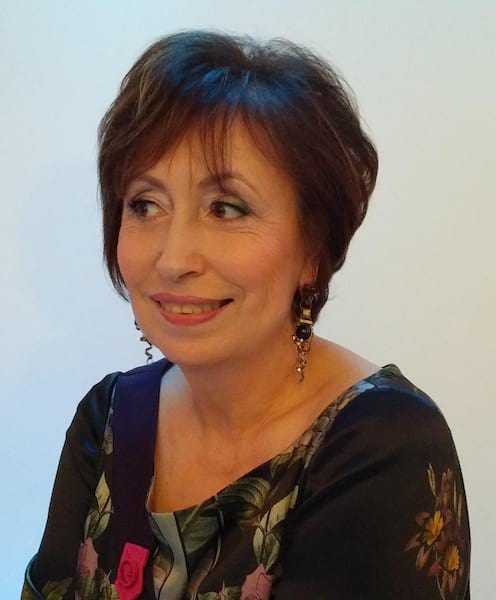 Birute Klaas-Lang, Professor of Estonian as a foreign language at the University of Tartu, and linguist, has been leading the Supervisory Board of the Integration Foundation for the last six months. In total, Birute has contributed to the Board of the Foundation for a year and a half. We asked her about the Integration Foundation and developments in adult language learning.
Birute Klaas-Lang, Professor of Estonian as a foreign language at the University of Tartu, and linguist, has been leading the Supervisory Board of the Integration Foundation for the last six months. In total, Birute has contributed to the Board of the Foundation for a year and a half. We asked her about the Integration Foundation and developments in adult language learning.
This year you took over the leadership of the Integration Foundation’s Supervisory Board. How do you evaluate this year's achievements of the foundation?
The achievements of the Integration Foundation are truly remarkable this year. I would particularly like to mention the opening and launching of Estonian Language Houses in Tallinn at the beginning of the year and in Narva on 1st October. These houses are not just rooms and hallways, but they are filled with Estonian content, competent teachers and staff who do a thank-worthy job with dedication and shine in their eyes. Language courses, language cafes and various hobby activities in Estonian create the opportunity to use more Estonian and thus become a better speaker of the language.
As a researcher and lecturer, I greatly appreciate the scientific excellence of the conference on integration organised by the Integration Foundation in November. Speakers from Europe and the US provided a very broad overview of recent research on multilingualism around the world, language learning in education, and the language of education. When I started school in 1964, with Estonian as the language of instruction, I brought from home Estonian, Lithuanian and Russian languages, being a very exceptional phenomenon at the time. Whereas today, multilingual families are the norm, not the exception. How to support a child with a different home language in the acquisition of the official language, while also contributing to the development of his or her home language - these are challenges for many countries, including Estonia.
What role do you see for the Foundation next year?
A new integration strategy is underway in Estonia. Certainly, the Foundation’s input will be crucial in this process. The Foundation will most probably continue its current integration support activities by initiating and implementing projects, arranging and conducting language courses as well as other direct and 'soft' learning activities, counselling, etc. The Estonian Language Houses have been launched, but there are new activities planned there, too.
Two million euros have been added to adult language learning for next year. It’s a lot of money that will help many people to improve their level of proficiency of the Estonian language.
The activities of the Foundation in integrating returnees have been less covered by the media. This area is definitely worthy of support and action - after all, these are our people who need support and help in reconnecting with Estonian society, finding their place and application, and tying up broken threads.
In the last two years, the teachers of the Estonian Language Houses of the Integration Foundation as well as our partners have received extensive further training at the University of Tartu, and you were responsible for the program. How do you assess the impact of this training?
At the Department of Applied Linguistics at the University of Tartu, we have developed and provided training for teachers who are starting work in the Estonian Language Houses, as well as for Estonian language teachers of multiple language companies, and leaders of various language and cultural projects. Designing these training programs has been a great and developing challenge for us. We have brought in the best expertise, both internally and externally. Our partners include the University of Tartu Viljandi Culture Academy, Institute of the Estonian Language, and other establishments. Through training, we have been able to improve the subject-related and didactic competence of teachers, and to provide new research-based knowledge of language learning and multilingualism. Teacher networking, i.e. developing their sense of community, is also very important. In addition, we have provided a lot of cultural experiences, theatre and concert visits for the teachers. With the support of the Ministry of Culture, it is our wish to continue with such trainings. The feedback from the learners has been very inspiring to us.
What are today's challenges of language learning for adults, and what new demands does it place on teachers and students?
It is not quite normal and usual in Europe to dedicate so much time and resources to teaching the official language for adults in Estonia. General education should give all residents of Estonia sufficient preparation for working in the official language and for further studies. Adult courses are a bug fix on the one hand, but on the other, in the absence of a supportive language environment, such as in Narva, Estonian language skills may inevitably get rusty over the years and need a boost. Teachers look forward to eager learners to their classes. When a competent teacher and a motivated learner come together, rapid progress and good results can be expected.
Irene Käosaar: The Integration Foundation is on firm feet!
 Irene Käosaar, Director of the Integration Foundation, looks back at the achievements of the past year and talks about what the Foundation's team, partners and Estonian language learners can expect from the new year.
Irene Käosaar, Director of the Integration Foundation, looks back at the achievements of the past year and talks about what the Foundation's team, partners and Estonian language learners can expect from the new year.
The main goal of the current year has been achieved: The Integration Foundation is operating in Narva, and the Estonian Language Houses in Tallinn and Narva have steadily started in their new premises. This year has brought us a lot of new things, with 16 new people having joined the team, we had to reorganize our work, but now we can say that we are all in place, we are on firm feet and working at full capacity. In addition to Tallinn and Narva, we have included Kohtla-Järve, Sillamäe and Maardu into our activities. Our Estonian Language Houses provide a great variety of opportunities to learn and practice the language. The activities of language cafes and clubs have started very well. People are increasingly realizing that language is not only learnt in courses, but often open communication and participation in cultural activities is just what is needed to make passive language skills active.
We are proud to have 10 Estonian language teachers joined our team from the academic year of 2018/2019. The first year is successfully finished and all of our teachers will continue in the new year - it’s a great achievement! The eyes of our teachers are shining, the classrooms are full of students, and the number of those who speak Estonian well is increasing.
Our counselling system and language learning are integrated with each other, learners, in consultation with counsellors, analyse their Estonian language skills and learning needs, and choose the type of learning that is best suited to them, be it at our Estonian Language Houses or other government agencies.
This year, the Ministry of Finance has entrusted us with the implementation of the activities of its Ida-Viru program, as a result of which 14 events in the field of culture or sports in Ida-Viru County have received support. Thanks to these projects, Ida-Viru County is becoming more open and homely with each day also to those people who have not been to this area much before. However, local businesses have the support to make their services even better. We have reached an agreement with the ministry that in the next two years we will give a boost to projects that help make the living environment of Ida-Viru County more attractive and revitalise the economic development of the region.
As we continue to speak about the developments of the next year, it is important to point out that thanks to the additional EUR 2 million allocated by the Ministry of Culture, we will be able to offer adult Estonian language learners 4,000 free places, twice as many as before, and further diversify their language practising opportunities. We will continue to train and recruit new teachers as well as as involve more language teaching companies.
We also plan to continue with the counselling of returnees and the conducting of experience meetings for them to help them adapt more smoothly.
While so far we have been working with the creation of the organisation, then next year we will be focusing more on our internal development by refining our services and administration - our primary goal is quality in everything. All for the purpose of people turning to us for help to get more support and be more satisfied with it.
The most outstanding developers in the field of integration were revealed
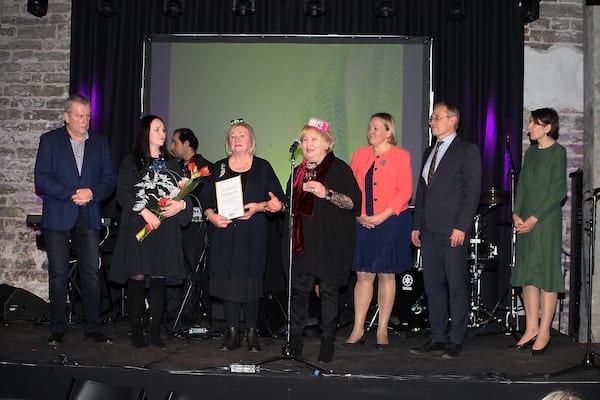 On December 13th the Ministry of Culture and the Integration Foundation recognized the most outstanding developers in the field of integration for 2018-2019. Integration prizes went to Ida-Virumaa Society of Tatar Culture, Tartu International House, author and editor of Raadio 4 broadcast “Keelekõdi” - Andrei Hussainov, and Logistika Pluss OÜ.
On December 13th the Ministry of Culture and the Integration Foundation recognized the most outstanding developers in the field of integration for 2018-2019. Integration prizes went to Ida-Virumaa Society of Tatar Culture, Tartu International House, author and editor of Raadio 4 broadcast “Keelekõdi” - Andrei Hussainov, and Logistika Pluss OÜ.
The purpose of awarding integration prizes is to recognize those who, over the past year, have contributed to introducing different cultures represented in Estonia, establishing contacts and developing cooperation between people with different native languages.
The prizes were awarded in four categories and the best project initiator of each category received a prize of € 1,000.
In the category “Introducing the cultures of national minorities living in Estonia to the Estonian public”, the award was given to Ida-Virumaa Society of Tatar Culture for conducting the international European Tatar folklore festival "Sabantuy" on 16th June 2018 in Tallinn. The number of visitors to the event was estimated at 10,000.
The prize in the category “Implementing co-operation projects between native Estonian and non-Estonian residents” was awarded to the Tartu International House for developing co-operation between new immigrants and the local community, covering, among other things, the creation of a network of Estonian and refugee youth, and the lead of joint training programs, meetings and workshops for them.
Andrei Hussainov, the author and editor of the show “Keelekõdi” of Estonian National Broadcasting’s Russian language radio program Raadio 4, received the prize in the category "Developing attitudes in support of integration through media projects". The weekly radio program provided listeners with an opportunity to improve their Estonian language skills in an understandable and exciting way. “Keelekõdi” turned out to be very popular with radio listeners, with an average of 20,000 people listening to each broadcast.
This year, for the first time, a prize was awarded in the category "Implementing initiatives in support of integration in the private sector". The award was given to Logistika Pluss OÜ, which organized free Estonian language courses for its employees during working hours. The courses resulted in a significant improvement in the Estonian language skills of their employees, and the company plans to organize similar courses in the future as well.
A total of 33 applications were received this year for the 2018-2019 Integration Projects Competition.
The Integration Foundation has been awarding prizes for integration development projects since 1999 and for media projects since 2009. The 2018-2019 competition for media and development awards in the field of integration was funded by the Ministry of Culture.
Which option for learning Estonian in the new year to choose?
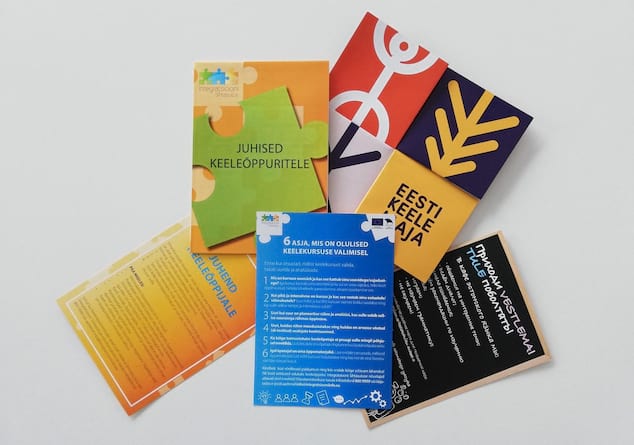 At the beginning of next year, registration for the Estonian language level courses by the Integration Foundation will take place again. Before you enrol in a course, it's a good idea to find out which form and level of study suit you best. It is worth remembering that in addition to the courses offered by the Integration Foundation, there are many other opportunities for learning Estonian for free.
At the beginning of next year, registration for the Estonian language level courses by the Integration Foundation will take place again. Before you enrol in a course, it's a good idea to find out which form and level of study suit you best. It is worth remembering that in addition to the courses offered by the Integration Foundation, there are many other opportunities for learning Estonian for free.
The Integration Foundation courses are not the only opportunity to learn Estonian free of charge - many other organisations and ministries offer language and cultural education. The list of opportunities offered by the state is quite long. The Integration Foundation Counselling Centre helps people who want to start or continue their language studies to find the right Estonian language learning option and training provider.
Ministry of Social Affairs and Unemployment Insurance Fund
The Ministry of Social Affairs offers, through the Estonian Unemployment Insurance Fund, Estonian language courses at the required level for working to people who have lost their jobs. In addition, the Unemployment Insurance Fund provides unemployment prevention services. These are intended for workers who need to be supported in changing or retaining a job because their skills are inadequate or outdated.
The Unemployment Insurance Fund also provides services to employers to support them in looking for workforce with the skills they need, or in preparing and carrying out restructuring. In addition, the Unemployment Insurance Fund provides employers with support for teaching their employees the Estonian language.
Ministry of the Interior’s adaptation program
The Ministry of the Interior offers free courses, as part of the adaptation program, for those who have obtained a temporary residence permit. The content of the course corresponds to A1 level and prepares the student for primary communication in Estonian. Read more here.
Foundation Innove. Reimbursement of tuition costs
The Foundation Innove has developed a reimbursement program of the tuition costs of Estonian language for those who are willing to pay for the courses themselves and receive financial compensation for their studies, if they pass the exam. Read more here.
Online platform “Keeleklikk”
The Ministry of Education and Research, in collaboration with the Integration Foundation, has created an online platform “Keeleklikk” for independent language learning for beginners (0-A2). The online Estonian language course can be taken on the basis of both Russian and English. The Estonian language course is available here.
For advanced language learners, the online platform Keeletee is suitable.
The spoken language practising events of Integration Foundation’s Estonian Language Houses
The Estonian Language Houses in Tallinn and Narva offer people who wish to practice the Estonian language several different opportunities each week, such as a language club with a guest, tandem studies, board games and movie nights, as well as various thematic workshops and study tours. Registration for the events of the Estonian Language Houses takes place day-to-day, information about the events and registration is available on the Facebook page of the Estonian Language House, on Instagram (@eestikeelemaja) and on the website of the Integration Foundation.
The Integration Foundation's counsellors analyse each person's needs and existing experiences, and propose the language learning option that is best suited for them. As a result of the counselling, the person is referred to a suitable training provider or enrolled in the Integration Foundation's Estonian language courses. You can register for personal language counselling by calling 800 9999 free of charge or by e-mail info@integratsiooniinfo.ee. See also the Integration Foundation's advisory website.
The grammar course is coming again!
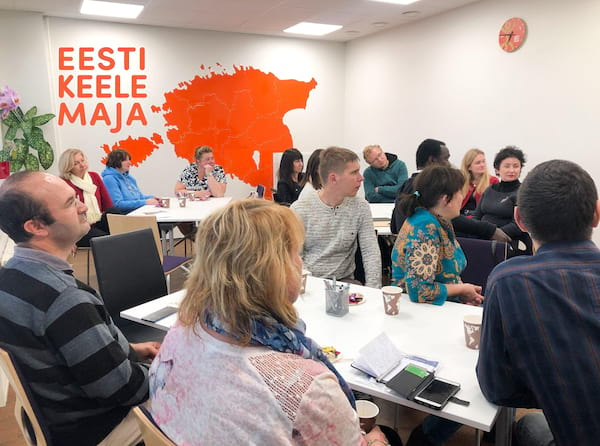 In spring, the grammar course held in Tallinn's Estonian Language House proved very popular with our students. As we are still addressed with a desire to study and practice Estonian grammar, we decided to open a new group for advanced learners next year.
In spring, the grammar course held in Tallinn's Estonian Language House proved very popular with our students. As we are still addressed with a desire to study and practice Estonian grammar, we decided to open a new group for advanced learners next year.
The course will begin in mid-January 2020 and will last until spring. Classes are held twice weekly during the day. A more detailed timetable will be available by the end of December, and we will announce it on our website and on the Facebook page of the Estonian Language House.
It will be a 60-hour study course where, in addition to learning and practising grammar, we will communicate and learn playfully.
The course is suitable for advanced learners with Estonian language proficiency level B1-C1.
You can register for the grammar course at eestikeelemaja@integratsioon.ee.
How can I study and practice language on my own during the holidays?
 If you wish to study Estonian independently during the holidays and practice it with the help of a computer or a smart device, there are several possibilities. Here are some of them that you can use for free.
If you wish to study Estonian independently during the holidays and practice it with the help of a computer or a smart device, there are several possibilities. Here are some of them that you can use for free.
- keeleklikk.ee - an online Estonian language course for beginners, where you can study on the basis of both Russian and English.
- keeletee.ee - online Estonian language courses for beginners and advanced, interactive exercises, animation, video, tests.
- efant.ee/std/ - a learning environment for Estonian language and Estonian history.
- keeleabi.eki.ee/?leht=11 - literacy tests.
- keeleressursid.ee/alias - word explanation game “ALIAS”.
- multikey.app - language practice application to help you find chat partners and practice your language online as well as directly.
- walktalk.ee - an application that helps you find expressions for certain situations and create your own dictionary.
- 50languages.com - an application for educational games and tests.
- kutsekeel.ee - study materials with professional vocabulary
- innove.ee/eksamid-ja-testid/eesti-keele-tasemeeksamid - Estonian language proficiency level exams
- keeleveeb.ee – dictionaries
- sonaveeb.ee – dictionaries
- filosoft.ee - dictionaries, speller, hyphenator
- keeleabi.eki.ee/?leht=1 - language advice by e-mail
-
631 3731 - language advice phone, answered at 9 am - 12 pm and 1 pm - 5 pm on weekdays.
Independent language learning is suitable for those who want to learn a language on their own, as well as for those who take courses. Remember that regularity and patience are important for independent learning. You have to learn every day, even just a little bit. You also need to give yourself time to reach results - patience and consistency are sure to lead you to the target!
Six recommendations to make language learning more effective
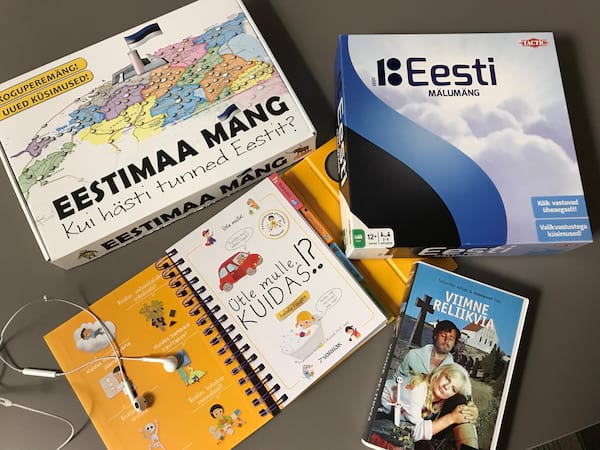 Use these simple recommendations to develop your language skills every day step-by-step with little effort.
Use these simple recommendations to develop your language skills every day step-by-step with little effort.
1. Use a language environment. For example:
- change your phone or social media channel settings to Estonian;
- watch and listen Estonian broadcasts, songs and cartoons;
- read children's books in Estonian;
- read posters, announcements and signs in the public space in Estonian;
- read Estonian menus in restaurants and cafes;
-
communicate with customer service representatives in Estonian.
2. Make language learning fun - play Estonian board games with friends or family.
3. Don't be afraid to speak Estonian! Use it every day.
4. Expand your vocabulary: learn new words in context.
5. Discover innovative language apps (e.g Speakly, Linqvist).
6. Keep a diary or blog about your language studies. Use it for describing your language learning achievements, biggest challenges and emotions. This way you can see your progress by going back in the notes later. This in turn will motivate you to continue your studies.
Application rounds coming
Integration Foundation is announcing the following application rounds for January:
- “Support for Foreign-Estonian Cultural Societies”;
- “Support for Cultural Societies of National Minorities”;
- “Integration-Promoting Cultural and Sporting Activities“;
- “Operational Support for Family Learning Partner Organisations“.
Information about the announced competitions will be disclosed on the Integration Foundation's website integratsioon.ee/konkursid.
Our calendar
Information on events that take place by our organisation, participation or support, can be found in the calendar published on our website.
Our news
You can read the latest announcements of the Integration Foundation in the news section of our website and on the Facebook page of the Integration Foundation or the Estonian Language House.
